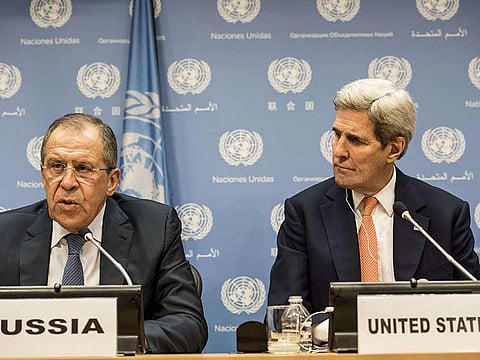UN unanimously backs Syria peace process
The resolution, however, does not touch on one of the most contentious issues: the fate of Bashar Al Assad

UNITED NATIONS: The UN Security Council unanimously adopted a resolution endorsing a peace process to put an end to the nearly five-year war in Syria.
US Secretary of State John Kerry said the resolution sends "a clear message to all concerned that the time is now to stop the killing in Syria."
The resolution, however, does not touch on one of the most contentious issues in the peace effort: the fate of Syrian leader Bashar Al Assad.
The resolution backed by the 15-member council calls for formal peace talks and a ceasefire to be launched in early January.
The United States, Russia and the other three permanent Security Council members - France, Britain and China - had sought UN endorsement of the diplomatic effort to highlight international unity on the way forward in Syria.
The resolution states that the "only sustainable solution to the current crisis in Syria is through an inclusive and Syrian-led political process that meets the legitimate aspirations of the Syrian people."
The measure draws heavily on statements agreed during previous talks in Geneva and Vienna by calling for an "inclusive transitional governing body with full executive powers" in Syria.
It asks the United Nations to bring the Syrian government and the opposition to the table for formal negotiations on a political transition "with a target of early January 2016."
"There obviously remains sharp differences," Kerry said, alluding to the fate of Assad.
"For this to work, the process has to be led and shaped and decided by the men and women of Syria."
But he added: "If the war is to end, it is imperative that the Syrian people agree on an alternative in terms of their government."
Key points of UN Syria resolution
The UN Security Council on Friday unanimously adopted a resolution endorsing the Syrian peace process, starting with formal negotiations and a ceasefire in early January.
Here are the key points of the resolution:
1. The council expresses "its gravest concern at the continued suffering of the Syrian people, the dire and deteriorating humanitarian situation, the ongoing conflict and its persistent and brutal violence, the negative impact of terrorism and violent extremist ideology in support of terrorism, the destabilizing effect of the crisis on the region and beyond, including the resulting increase in terrorists drawn to the fighting in Syria, the physical destruction in the country, and increasing sectarianism."
2. "The only sustainable solution to the current crisis in Syria is through an inclusive and Syrian-led political process that meets the legitimate aspirations of the Syrian people, with a view to full implementation of the Geneva Communique of 30 June 2012... including through the establishment of an inclusive transitional governing body with full executive powers, which shall be formed on the basis of mutual consent while ensuring continuity of governmental institutions."
3. The resolution encourages the diplomatic efforts of the 17-nation International Syria Support Group (ISSG) to help bring an end to the conflict in Syria and describes the grouping as the "central platform to facilitate" UN efforts to achieve a lasting settlement.
4. The resolution notes "in particular the usefulness of the meeting in Riyadh" earlier this month that brought together political and armed opposition groups to agree on a negotiating team for the peace talks.
5. Requests that UN Secretary-General Ban Ki-moon and his special envoy for Syria, Staffan de Mistura, "convene representatives of the Syrian government and the opposition to engage in formal negotiations on a political transition process on an urgent basis, with a target of early January 2016."
6. Expresses support for establishing within a target of six months a "credible, inclusive and non-sectarian governance", drafting a new constitution and holding "free and fair elections" supervised by the United Nations within 18 months.
7. All Syrians including members of the diaspora would be eligible to take part in the elections.
8. Expresses support for a nationwide ceasefire in Syria "to come into effect as soon as the representatives of the Syrian government and the opposition have begun initial steps towards a political transition under UN auspices."
9. Requests that the UN lead the effort to determine the modalities of the ceasefire and urges member-states to press all sides in Syria to abide by such a ceasefire.
10. Calls for a ceasefire monitoring and reporting mechanism.
11. Welcomes Jordan's effort to draw up a list of groups deemed to be terrorists.



